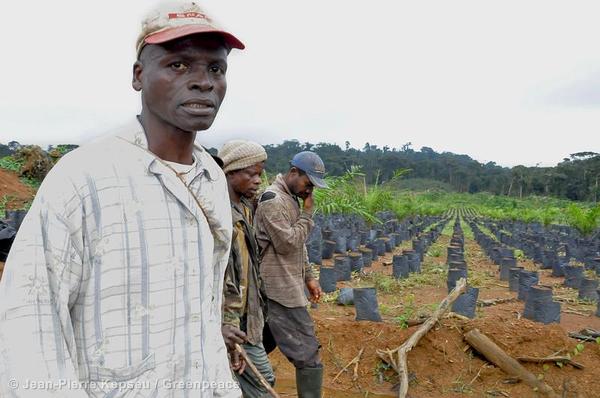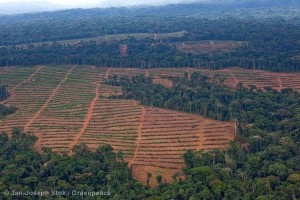
As the rain thunders down, it becomes not just increasingly hard to hear the speakers but also to see them. The lack of light due to the poor electricity supply in this part of South West Cameroon means that as the clouds darken, the room in the Ebanga village hall does likewise.
It is clear that this village and the whole area is sorely lacking basic facilities that many in the West, including myself, take for granted. But thedilemma that development has to be at the cost of protecting the environment is a false one.
What is not lacking here is a desire by locals to be involved in what is done with their land and ultimately their livelihoods. Something again that many in the West would take as a given.
 That is what this meeting, held by local NGO Nature Cameroon with Greenpeace and local villagers, is all about. It is part of a communities tour in the densely forested area that US agribusiness companyHerakles Farms wants to convert into a large palm oil plantation, that will have huge effects on the lives, land and livelihoods of residents.
That is what this meeting, held by local NGO Nature Cameroon with Greenpeace and local villagers, is all about. It is part of a communities tour in the densely forested area that US agribusiness companyHerakles Farms wants to convert into a large palm oil plantation, that will have huge effects on the lives, land and livelihoods of residents.
Herakles claims they have already consulted with the large majority of people in the area and that most are in favour of what they propose(something they have to do under the African Charter for Human Rights). However, as Greenpeace and its partners visit the communities one by one, a different picture emerges.
Many here have been excluded from the process. It is true that several village chiefs (some of whom are rarely present in their village) have made land deals with the company, but the majority of villagers have little to no input.
In Ebanga, comments like I want electricity before I want them in my forests echo. Some villagers say they signed an agreement with Herakles without fully understanding the fine print and now feel they feel trapped.
When information is distributed showing the rate Herakles intends to pay people for their land compared to the rate paid elsewhere, including in Malaysia, there is shock and dismay.
Not far up the bumpy, unpaved road, residents in Babensi 2 village long ago said they did not wish to be part of Herakles plantation. But their voices are now part of a long list of people’s that the companys executive refuses to listen to.
Following a sweaty 90-minute trek through thick bush, we emerge to a cleared area that was once home to Babensi 2 forest. It has now been bulldozed by Herakles as they expand the area around their nursery in the neighbouring village of Talangaye.
The remaining trees in Babensi 2 territory are now daubed with red paint as Herakles has demarcated the land.
We have written so many complaints about Herakles Farms, says Adolf Ebong Ndbe, the regent of the village. “How can they enter our land without permission?”

Adolf and other villagers rely on the forested land behind their homes for their livelihoods. But they say the actions of Herakles mean it is their children who will miss out.
In future we are worried that our children will not even get to see the animals that live in the area, says John Ebenki, another villager.
The villagers are now taking their complaints to the relevant authorities, but that does not seem to deter Herakles. Only two weeks after our visit, a team of local NGO members and a Greenpeace campaigner were ambushed and assaulted by Herakles employees in this same spot, continuing their heritage of using intimidatory tactics and violence to try and suppress Cameroonian civil society and any local opposition to their work.
This is not an isolated incident. In another village, Elizabeth tells us how one day she found a Herakles employee manned with a chainsaw, carving down her mango trees. She had received no prior notice. Armed with only a written inventory of her property, she is now working with local NGOs to seek new land and compensation from the relevant authorities.
Stories of customary landowners being mistreated and having their basic rights ignored by corporations seeking profit are commonplace across Africa. Companies like Herakles need to be shown that they are acting irresponsibly and badly when it comes to the continent’s palm oil production.
The threat the Herakles project poses tolocal communities, local livelihoods,local biodiversityand the local environment has been well documented andit is now time that the project was finally stopped, once and for all.
* Elizabeths real name has not been used for security reasons.


